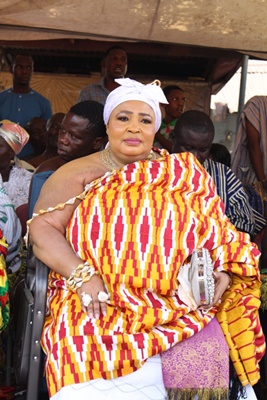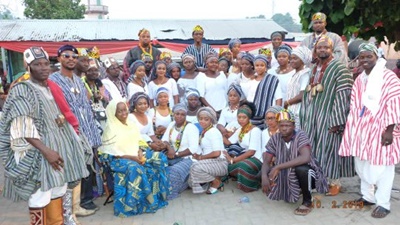The entire mining town of Obuasi went agog as hundreds of people from all walks of life trooped to the Zongo Playgrounds, to join in the celebration of this year’s Damba festival. The event was organised by the Dagomba youth group based in Obuasi.
There was the exhibition of rich culture from the various Northern Regional tribes at the festival which commemorates the birth of Prophet Mohammed. It was also to signify unity, cooperation and coexistence amongst the people.
The two-day celebration was under the theme: ‘Harnessing our Cultural Diversity for Job and Wealth Creation’. It had in attendance Nana Akua Dwom II, Queenmother of Edubiase; Municipal Chief Executive for Obuasi, ElijahAdansi-Bonah; Chiefs from various tribes as well as religious leaders.
The Chairman of the Dagomba Youth Association, Shaban Ibn Bawa in his speech said the celebration of the Damba festival dates back to the 18th Century during the reign of Naa Zanjina. He emphasized that the festival was mostly celebrated by the Dagombas but has now spread to other stratified Northern tribes like Mamprusi, Gonja and Wala.
He advised that Dagombas and other Northern tribes should use occasions like the Damba festival to unite and co-exist peacefully since the festival symbolises unity of the Mole-Dagban and all the sons and daughters of Naa Gbewaa.

Touching on the theme for the celebration ‘Harnessing our Cultural Diversity for Job and Wealth Creation’, Mr. Bawa said the Youth should strive to acquire entrepreneurial skills which will guarantee them a secured future other than adopting the “get rich quickly syndrome.”
Damba should unite all tribes
The Queen Mother of the Edubiase Traditional Council Nana Akua Dwom II, who graced the occasion with the Dompoase Kontihene, Nana Bosompim Kitikyi Appenteng, extolled the Damba festival and praised the organisers for assembling most of the tribes in Ghana to exhibit their culture.
She emphasized that the only panacea to Ghana’s development is for the people to accommodate or tolerate other tribes. She said: “the mere fact that we are here should tell everyone that, with unity of purpose and tolerant for divergent views and other culture, Ghana will develop beyond what we are seeing now.”
The need for the Zongo youth to pursue higher education
A founder of the Dagomba Youth Association in Obuasi, Masawudu Arabia called for the need for Zongo Youth to prioritize higher education. He said ” gone are the days when youth from Zongo were associated with all manner of crimes but the time has come for us to prove to the world that people from Zongo value the essence of formal education.
He reiterated the call for peaceful co-existence. He said peace is an enabler to enhance development and that all must give peace a chance. He urged the people to do away with division, because that would retard development in the area.
The Obuasi Municipal Chief Executive, Elijah Adansi-Bonah pledged government’s preparedness to be innovative in reducing poverty among residents.
The Damba Festival
The Damba Festival is celebrated by the chiefs and peoples of the Northern, Savanna, North East and Upper West Regions of Ghana. The name Damba in Dagbani, Damma in Mampruli and Jingbenti in Waali.
The festival is celebrated in the Dagomba lunar month of Damba, corresponding to the third month of the Islamic calendar, Rabia al-Awwal. Damba is celebrated to mark the birth and naming of the Holy prophet, Muhammad, but the actual content of the celebration is a glorification of the chieftaincy, not specific Islamic motifs. The Damba is also celebrated among the Gonjas of the Savanna region. The Gonjas normally have a specific month of which the celebrate the festival. The festival is categorized into three sessions; the Somo Damba, the Naa Damba and the Belkulsi.
The festival starts on the 10th day of the month of Damba with the ‘Somo’ Damba, followed by the ‘Naa’ Kings Damba on the 17th day, with the ‘Bielkulsi’, which is the climax of the celebration, coming off on the 18th of the month of Damba. Within this period, prayers are offered to ancestors, drumming and dancing, families pay visits to friends and exchange gifts.










